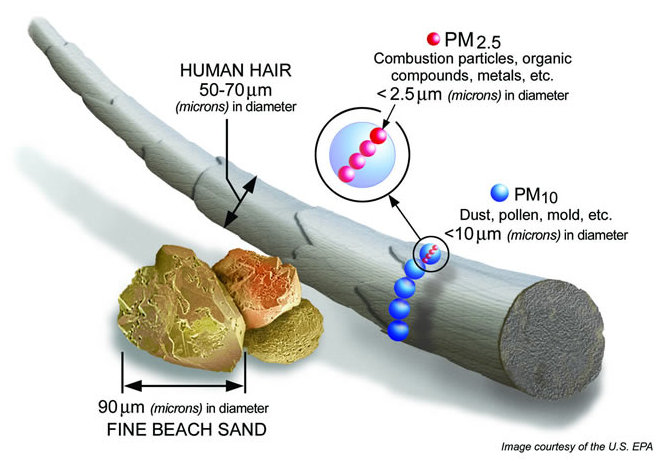From Covid19 global pandemic to wild fires and air pollution, it appears that lately the world’s biggest problems have been microscopic in size. Air pollution is one of the leading causes of death worldwide, actually deadlier than smoking, malaria or AIDS.
You can get a general idea from the diagram above; But just to further give you an idea on the relative size of particles, please check the diagram below. A particle needs to be less than 10 microns for it to be inhaled into the lungs:
| Particles | Average Size (microns, μm) |
|---|---|
| Zika virus | 45nm |
| T4 Bacteriophage | 225nm |
| Coronavirus COVID-19 (SARS-CoV-2) |
0.1-0.5μm |
| Bacterium | 1-3μm |
| Light dust particle | 1μm |
| Dust particle: PM2.5 | ≤2.5μm |
| Respiratory droplets containing COVID-19 | 5-10μm |
| Red blood cell | 7-8μm |
| Dust particle: PM10 | ≤10μm |
| Pollen grain | 15μm |
| White blood cell | 25μm |
| Visibility threshold (Limit of what the naked eye can see) |
10-40μm |
| Grain of salt | 60μm |
| Fine beach sand | 90μm |
| Human hair | 50-180μm |
In this blog, I would like to focus on how these “PM” (Particulate Matter), which can contain dust, combustion particles, organic compounds, metals averaging around 2.5 microns, affect the health of our hair.
First of all, our hair is like a sponge and records everything that it has been exposed to. A single strand of hair confirmed how Napoleon died: Poisoned from Arsenic. Hair keeps track of all agents we’re subjected to whether it’s internal or external. Meanwhile, scalp is a barometer of our physical health.
The first “external” indication of pollution on hair would be “Dullness“. The polluting particles attach to the hair fibre creating accumulation of polluting molecules, eventually asphyxiating the hair shaft. The hair also becomes more “Porous“, opening up the cuticles, leading to loss of water and sebum. Once there is loss of hydrolipidic film (made of water and sebum), the hair becomes “Brittle” and “Breakage” occurs.
In response to this aggression, not only is the hair affected, the scalp and skin start producing more sebum to help rebuild the hydrolipidic film faster. Eventually, the excess sebum production can suffocate the hair follicles leaving you with oily dirty scalp/hair which need to be shampooed more frequently. This vicious cycle of over washing and overproduction of sebum must be stopped. This is done by adopting a good scalp care ritual.
Another “internal” consequence of pollution is “inflammation” and oxidative stress on the scalp. This can lead to various scalp disorders such as dandruff, dermatitis etc and ultimately Hair Loss. A research was done in 2019 in South Korea (https://eadvmadrid2019.org/wp-content/uploads/2019/10/PR4-Pollution-Baldness.pdf) that investigated the link between hair loss and air pollution. They studied the effects on the cells located in the Dermal Papilla which attaches the hair to the scalp, the control centre for the hair cycle. They found out that 24 hrs following exposure to pollutant particles, they noticed a drastic drop in the production of beta catenin – the protein responsible for hair growth as well as in the production of 3 other proteins responsible for hair growth and retention.
With this in mind, it is really important to adopt a good scalp/hair care ritual that you can do at home. At Yoko’s Haute Coiffure & b-yu Head Spa, we can certainly help you build a personalized regime based on your scalp/hair condition using exclusively our Rene Furterer innovative scalp care line. Along with your regular home care ritual, we recommend you combine it with regular professional Head Spa or Scalp Treatment services for resolving problems, helping keeping track of your hair/scalp health and for maintaining future scalp/hair health. Please check our Head Spa / Scalp Treatment services we offer at https://b-yu.com/services/head-spa/#75min
We look forward to taking care of you! 🙂

